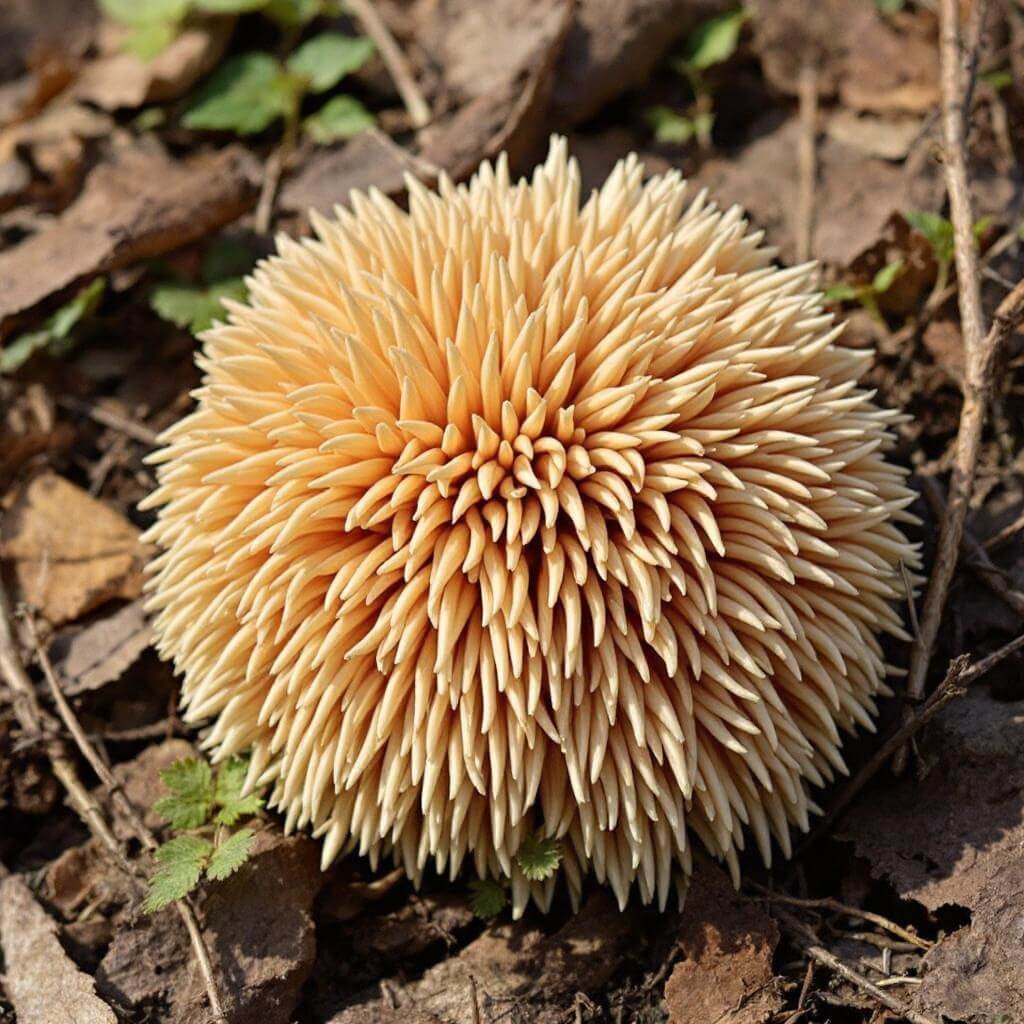Physical Address
304 North Cardinal St.
Dorchester Center, MA 02124
Physical Address
304 North Cardinal St.
Dorchester Center, MA 02124

Lion’s Mane vs. Caffeine: Which delivers better mental clarity and focus? Compare their benefits, side effects, and long-term brain health impact.
As our daily routines become increasingly demanding, staying mentally sharp isn’t optional—it’s essential. Whether you’re powering through a deadline, tackling a study session, or trying to clear persistent brain fog, chances are you’ve turned to caffeine more than once. But what if there’s a cleaner, calmer way to boost focus and support your brain long-term? That’s where the debate around Lion’s Mane vs. Caffeine begins.

On one side, you have caffeine, the world’s most consumed psychoactive substance—fast, familiar, and reliable. It sharpens your mind, increases alertness, and jumpstarts your energy levels in minutes. On the other, Lion’s Mane mushroom, a natural nootropic praised for enhancing mental clarity, promoting neurogenesis, and reducing cognitive fatigue—without the crash.
As people move toward biohacking and holistic brain support, the question isn’t just about energy anymore—it’s about sustainable cognitive performance. And if you’re tired of the jittery highs and draining lows of your morning cup, exploring natural focus enhancers like Lion’s Mane may be the smartest shift you make this year.
In this in-depth guide, we’ll break down Lion’s Mane vs. Caffeine across key areas: benefits, drawbacks, long-term brain health, and who each supplement is best suited for. Whether you’re chasing productivity, better memory, or stress-free focus, this comparison will help you choose the right cognitive ally.
Ready to upgrade your brain? Let’s dive into the science behind these two powerful mental clarity supplements and discover which one truly deserves a place in your daily stack.
Lion’s Mane (Hericium erinaceus) is a unique, white, shaggy mushroom that resembles a lion’s mane—hence the name. Used for centuries in Traditional Chinese Medicine and Japanese healing traditions, Lion’s Mane has recently gained global recognition as a natural nootropic and cognitive-enhancing supplement. Unlike synthetic stimulants, it works subtly and steadily, nurturing your brain’s long-term health while improving clarity, memory, and focus.
What makes Lion’s Mane exceptional is its ability to stimulate nerve growth factor (NGF)—a protein essential for the survival, development, and function of neurons. NGF encourages the regeneration of damaged nerve tissue, which is vital for memory retention, mood regulation, and cognitive sharpness.
This mushroom doesn’t just boost brain performance; it may help rewire your mind by promoting neuroplasticity, the brain’s ability to form new connections and pathways. That’s why many biohackers and wellness enthusiasts reach for Lion’s Mane as a long-term solution to brain fog, not just a quick fix.
Scientific and anecdotal reports suggest a wide range of brain-supportive benefits:
A 2009 double-blind placebo-controlled study found that adults who took Lion’s Mane for 16 weeks showed significant cognitive improvements compared to a placebo group. Other studies show its potential in managing mild cognitive impairment (MCI) and boosting mental energy in fatigued individuals.

Unlike caffeine’s quick spike of energy, Lion’s Mane produces a calm, steady clarity that builds over days or weeks. Users often report subtle yet noticeable increases in mental endurance, emotional stability, and creative thinking.
There’s no crash, no jitters, and no spike in heart rate—just a quiet confidence in your cognitive performance. This makes Lion’s Mane ideal for anyone sensitive to stimulants or looking for a natural brain booster without side effects.
Lion’s Mane is available in:
For noticeable effects, choose a dual-extracted supplement that contains at least 30% polysaccharides and beta-glucans. Daily use over 2–4 weeks is recommended to feel full benefits.
Caffeine is the world’s most widely consumed psychoactive substance—found in coffee, tea, energy drinks, chocolate, and countless supplements. It’s fast, familiar, and effective. For millions, caffeine is the go-to tool for a quick mental lift, improved physical performance, and staying awake during long work or study sessions. But how does it really compare in the battle of Lion’s Mane vs. Caffeine?
Let’s explore the powerful benefits—and potential pitfalls—of this well-known stimulant.
Caffeine works by blocking adenosine receptors, a key neurotransmitter that promotes relaxation and sleepiness. By doing so, caffeine temporarily prevents the brain from receiving signals that it’s tired—creating an illusion of increased energy and alertness.
Within 20–30 minutes of consumption, caffeine can:
That’s why it’s so effective for high-pressure tasks, workouts, or waking up your brain in the morning.
When used strategically, caffeine can be a reliable mental clarity booster, especially in controlled, moderate doses.

Despite its popularity, caffeine has several downsides—especially when overused or consumed inconsistently:
If you find yourself needing more cups of coffee to get the same effect, it might be a sign that caffeine is becoming more of a crutch than a clarity tool.
For most adults, up to 400 mg of caffeine per day (roughly 3–4 cups of brewed coffee) is considered safe. However, individual tolerance varies. People with anxiety, heart issues, or sleep disorders may benefit from much lower doses—or avoiding caffeine entirely.
It’s also important to watch for hidden sources like energy drinks, pre-workouts, and even some “natural” nootropic stacks.
To maximize benefits and minimize drawbacks:
When comparing Lion’s Mane vs. Caffeine, it’s crucial to distinguish between short-term stimulation and long-term cognitive support. While caffeine is great for an instant jolt of mental energy, its long-term brain benefits are limited and potentially counterproductive when overused. Lion’s Mane, on the other hand, may offer sustained support for brain health and mental clarity over time.
Let’s break down what the science says about each.
Lion’s Mane stands out among natural nootropics because it actively promotes neurogenesis—the growth of new brain cells and neural pathways. This regenerative quality sets it apart from most herbal or synthetic brain boosters.
This makes Lion’s Mane a strong candidate for individuals seeking to maintain mental sharpness, reduce brain fog, and protect cognitive health as they age.
While caffeine has clear short-term benefits for alertness and energy, its long-term effects are far more complicated—and in some cases, detrimental.
Unlike Lion’s Mane, caffeine does not support the underlying mechanisms of brain health. It merely masks fatigue, potentially contributing to long-term exhaustion and mental wear if used without balance.
| Feature | Lion’s Mane 🌿 | Caffeine ☕ |
|---|---|---|
| Supports neurogenesis | ✅ Yes | ❌ No |
| Reduces oxidative brain stress | ✅ Yes | ❌ No |
| Boosts NGF production | ✅ Yes | ❌ No |
| Promotes mental clarity over time | ✅ Gradual and sustainable | ⚠️ Temporary; may lead to crash |
| Risk of tolerance or dependence | ❌ No | ✅ Yes |
| Cognitive protection (long-term) | ✅ Promising research | ⚠️ Inconclusive/limited |
If your goal is to optimize brain performance for years—not just hours—Lion’s Mane clearly outpaces caffeine in terms of neuroprotective effects, mental resilience, and stress reduction. Caffeine may still have a role in your productivity stack, but relying on it long-term without addressing brain health fundamentals can backfire.
When it comes to Lion’s Mane vs. Caffeine, the better choice depends on your goals, biology, lifestyle, and even your sensitivity to stimulants. One size doesn’t fit all—so this section will help you decide which focus enhancer suits your specific mental clarity needs.

Lion’s Mane is ideal for individuals seeking natural, sustainable cognitive support without the crash or anxiety that sometimes comes with stimulants.
It’s also a powerful tool for entrepreneurs, creatives, students, or aging adults who want to improve mental performance and clarity without sacrificing their well-being.
🧠 Biohacker’s Tip: Stack Lion’s Mane with other adaptogens like Rhodiola or Ashwagandha for synergistic effects on mood, resilience, and focus.
Caffeine shines when used strategically—particularly when you need a fast, effective mental boost or physical energy.
Caffeine works best for people who can manage their intake carefully, avoid over-reliance, and maintain good sleep hygiene.
⚖️ Pro Tip: Pair caffeine with L-theanine (found in green tea) to smooth out the stimulation and reduce side effects like jitters or energy crashes.
Absolutely—if done intentionally.
Many users benefit from a dual approach:
This hybrid method can deliver both immediate results and lasting brain benefits, without burning out your system. Just avoid taking caffeine too late in the day, as it may reduce deep sleep quality, which is crucial for memory consolidation and mental clarity.
| Your Situation | Go With |
|---|---|
| Brain fog, poor memory | 🧠 Lion’s Mane |
| Need immediate energy for a meeting/workout | ☕ Caffeine |
| Anxiety-prone or sleep issues | 🧠 Lion’s Mane |
| Tight deadline or all-nighter | ☕ Caffeine (with caution) |
| Want sustainable cognitive health | 🧠 Lion’s Mane |
| Want a quick mood and motivation boost | ☕ Caffeine |
If you’re chasing clarity, creativity, and calm focus—Lion’s Mane is your ally. If you need energy-on-demand and perform well under stimulation—caffeine might be your tool. But for many, the sweet spot lies in using both mindfully based on your needs.
Is Lion’s Mane better than caffeine for focus? It depends on your goals. Lion’s Mane supports long-term brain health and clarity without causing crashes or jitters, while caffeine offers short-term mental energy. If you want sustainable focus, Lion’s Mane is the better choice. For immediate alertness, caffeine wins.
Can you take Lion’s Mane and caffeine together? Yes! Many people stack Lion’s Mane with caffeine to combine long-term cognitive support with short-term energy. This pairing enhances alertness while reducing the negative side effects of caffeine, especially when paired with L-theanine.
How long does it take for Lion’s Mane to work? Lion’s Mane typically takes 1–2 weeks of consistent use to show noticeable cognitive benefits. Some users report subtle improvements in mood and focus within days, but its true effects come with regular supplementation.
Does caffeine harm your brain long-term? In moderate amounts, caffeine is generally safe. However, overuse can lead to sleep disruption, tolerance, and even cognitive fatigue over time. Unlike Lion’s Mane, caffeine doesn’t promote brain growth or protect against neurodegeneration.
What are the side effects of Lion’s Mane? Lion’s Mane is considered very safe, with few reported side effects. Rare cases include mild digestive upset or skin irritation. It’s non-habit forming and doesn’t interfere with sleep like caffeine might.